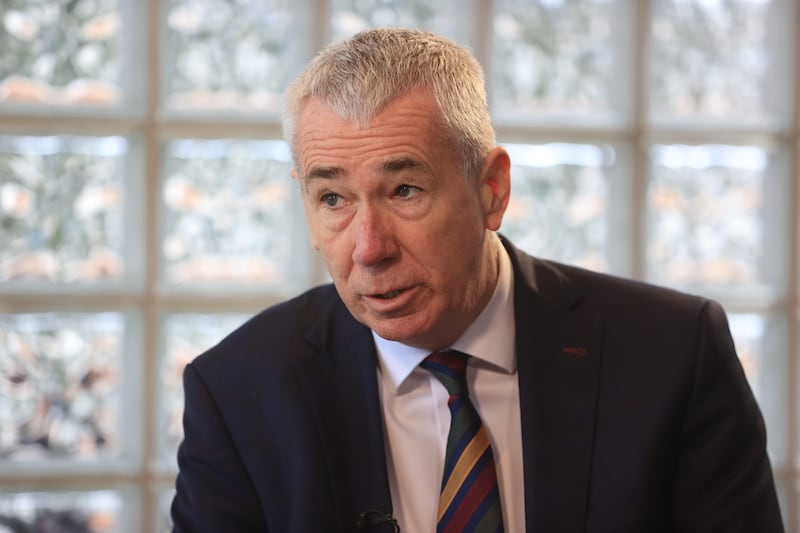In case you missed the memo, reconciliation is the new supermajority.
Just as 50 per cent-plus-one is not enough for Irish unity, and in fact would be downright dangerous, so it is the case that unity must now only be considered in the event of the north of Ireland being transformed into the land of milk and honey, a Shangri-La from the Foyle to the Lagan where peace and harmony reins and a discordant word is never uttered.
BBC NI’s flagship political television programme, The View, provoked a response from many nationalists on social media earlier this month when it posed the question as to whether reconciliation ‘or’ unity should be the priority for nationalists today, the clear inference being that a pitch for one necessitates demoting interest in the other.
- City Hall statues show our civic spaces can no longer exclusively reflect one identity – Chris DonnellyOpens in new window
- Time for unionism to catch the Casement vision - Chris DonnellyOpens in new window
- Chris Donnelly: The north has changed - but the media’s obsession with unionism remainsOpens in new window
This has been a theme cynically picked up by many unionists and others in the media over recent years in the vain attempt to stymie efforts to grow support for a border poll and for serious Irish government led planning and preparation for unity to commence as early as possible.
In response to Brian Feeney stating on the programme that reconciliation and reunification were not mutually exclusive, the Ulster Unionist leader, Doug Beattie, even tweeted that Feeney - and by extension those supporting unity - wanted to “drag [unionists] kicking and screaming” into a united Ireland.
A century and more into the life of this troubled state, the absence of ‘reconciliation’ has not meant that British sovereignty has in any way been removed nor diminished over the jurisdiction, meaning that those who cynically set its attainment as a precondition for unity are clearly happy for British sovereignty to not be impacted at all by the reconciled status of this place.
One of the most compelling arguments in favour of Irish unity is that it provides the political and constitutional framework within which true and lasting reconciliation can be achieved within this society
Of course, the same people are quite happy for the north to remain in the UK on the basis of 50 per cent-plus-one support.
Be in no doubt but that Irish political reunification will take place at least a generation prior to substantive reconciliation happening across this society. That’s because it is the very existence of the artificially created northern statelet which has perpetuated division, empowering those with the most reactionary mindsets and holding back the evolution of a genuinely reconciled society, at peace with itself.
Those making the case that unity must await reconciliation are telling the most reactionary people in this society they can exercise a veto over unity by continuing to perpetuate division and instability, thereby preventing a more reconciled society.
- The use of injustice to hold on to power is endemic in the British state – Tom CollinsOpens in new window
- Ireland’s friends in America are right: planning for a border poll has to avoid the mistakes of the Brexit shambles - The Irish News viewOpens in new window
- Reconciliation should come before a border poll if we are to have an Ireland that is better, not bitter - Tom KellyOpens in new window
Think for a moment about the consequences on the international stage of applying the same test of reconciliation to political developments. Were reconciliation to have been a precondition for substantive political change, the southern states of the USA would still form a separate sovereign confederate nation distinct from the north whilst the onset of a democratic South Africa would have been contingent upon harmonious relationships between white Afrikaaners and the majority black population, which continue to be uneasy to this day.
And then there is Germany, where more than 30 years after reunification, the east continues to be less developed and distinct from the west in many ways, cultural and economic, on account of the separate existences lived for the 40 years following the Second World War.
One of the most compelling arguments in favour of Irish unity is that it provides the political and constitutional framework within which true and lasting reconciliation can be achieved within this society.
Of course, that does not mean unity supporters should breezily dismiss efforts to promote reconciliation. On the contrary, it is incumbent upon those working for Irish unity to demonstrate, in words and deeds, that reconciliation is a priority today and as part of the planning for unity - regardless of every realistic assessment concluding that lasting reconciliation is a project for the generations.
****
THERE will be many who won’t mourn Leo Varadkar’s political passing. His tenure has witnessed the emergence of an ugly anti-migrant movement across the state, a product of the coalition government’s abysmal failure to address the housing crisis and its decision to show solidarity with Western leaders by welcoming into the state a disproportionately high number of Ukrainians following the Russian invasion.
Yet his legacy will also include deftly managing the Brexit crisis to avoid a hard border on the island, whilst also firmly repositioning Fine Gael as a more authentically pro-Irish unity party just at the time when serious planning and preparation for unity has finally begun.









